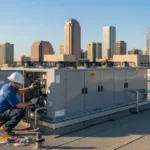If you’ve lived in Fort Worth for any amount of time, you know our weather doesn’t play around. Summers are long, hot, and sticky, while winters sneak in with cold fronts that make you double-check the thermostat.
Now, if you’re running a business here, keeping your building comfortable isn’t just about “nice to have”—it’s about survival. Employees can’t focus if they’re sweating in the office, customers won’t stick around if your shop feels like a sauna, and equipment doesn’t last long when the temperature is out of whack.
That’s where commercial HVAC comes in. But let’s be real—understanding what system you need, how much it’s going to cost, and which contractor you can actually trust in Fort Worth isn’t always easy.
This guide will walk you through it all: the basics of commercial HVAC, what kind of systems fit best around here, what you’ll pay, and the kind of tips that can save your business thousands down the road.
What Exactly Is Commercial HVAC?
In simple words, HVAC stands for heating, ventilation, and air conditioning. Residential HVAC systems are made for homes, while commercial systems are built tough for bigger spaces—think office towers, warehouses, schools, retail shops, or restaurants along West 7th or Sundance Square.
Here’s the difference:
- Size matters. A home AC cools a living room. A commercial system cools entire floors.
- Location. Most Fort Worth businesses use rooftop units so techs can work without bothering people inside.
- Flexibility. Commercial systems can handle multiple zones. One office can be cooler, another warmer.
Because Texas heat doesn’t take breaks, these systems often run harder and longer than in other parts of the country. That’s why businesses here can’t afford to cheap out on equipment or maintenance.
Why It Matters So Much in Fort Worth
Let’s be real—comfort sells. If your restaurant patio is cool inside but feels like a swamp by the bar, customers notice. If your office feels like an oven, productivity takes a dive. And let’s not even talk about warehouses without proper ventilation—machines overheat, products spoil, and workers complain.
For Fort Worth specifically:
- Heat + Humidity: Summers hit triple digits. Humidity makes it worse.
- Energy Bills: In Texas, AC is one of the biggest utility costs for businesses.
- Customer Experience: Comfortable spaces keep people inside longer.
- Air Quality: Dust and pollen in North Texas are no joke—bad air makes allergies flare up.
In short, HVAC isn’t just about comfort—it’s about keeping your business running.
Types of Commercial HVAC Systems in Fort Worth
Not every building in Fort Worth needs the same setup. Here’s a quick rundown of the most common systems you’ll find around town:
- Rooftop Units (RTUs) – These are the workhorses. Most strip malls, offices, and big-box stores use them. Easy access for repairs keeps noise out of the building.
- Split Systems – Good for smaller offices or restaurants. Part of the unit goes inside, part stays outside.
- VRF/VRV Systems – More advanced and energy-efficient. Great for places like hotels or mixed-use spaces where different rooms need different temps.
- Chillers & Boilers – Usually for really big setups like hospitals, schools, or corporate campuses.
💡 Tip: For most small to mid-sized businesses in Fort Worth, rooftop units and VRF systems are the go-to choice.
What Does It Cost in Fort Worth? (2025 Pricing)
Now to the question everybody asks first: “How much is this going to cost me?”
The truth is, it depends on your building size, the system you choose, and how efficient you want it to be. Here’s a ballpark:
Installation Costs
- Small businesses (under 5,000 sq. ft.): $7,000 – $15,000
- Medium businesses (5,000–20,000 sq. ft.): $15,000 – $40,000
- Large facilities (20,000+ sq. ft.): $40,000 – $100,000+
Repairs (Average in Fort Worth)
- Thermostat replacement: $150 – $400
- Refrigerant recharge: $200 – $800
- Compressor repair: $1,200 – $3,000
- Emergency call: $200+ just to get a tech out after hours
Maintenance
- Basic contract (inspection + filter changes): $1,000 – $3,000 per year
- Full-service contract: $4,000 – $10,000 per year
👉 The upside? Energy-efficient systems can chop 20–40% off your power bill, which is huge for Fort Worth businesses that run AC for most of the year.
Common Services Offered in Fort Worth
When you call a commercial HVAC company around here, these are the services you’ll see most:
- System installation and replacement
- 24/7 emergency repairs (especially critical in July and August)
- Seasonal maintenance
- Ductwork cleaning and sealing
- Indoor air quality solutions (filters, purifiers, etc.)
- Energy audits to find leaks and wasted power
Some companies even offer smart building automation—think thermostats and sensors that keep temps steady without you having to lift a finger.
How to Choose the Right Contractor in Fort Worth
Picking a contractor can feel like rolling the dice, but it doesn’t have to. Here’s what to check before signing anything:
- Licensing & Insurance – Texas requires HVAC contractors to be licensed. Don’t skip this step.
- Local Reputation – Look up reviews on Google, Yelp, or BBB. Fort Worth folks don’t hold back if a company does bad work.
- Response Time – If your AC dies on a Friday night, you don’t want a contractor who’s booked out until Tuesday.
- Knowledge of Rebates – Ask about local energy incentives. Oncor and TXU often have rebates for efficient systems.
- Clear Contracts – A good contractor explains costs upfront—no surprises later.
Maintenance Tips for Fort Worth Businesses
Here’s the truth: maintenance is where most businesses drop the ball. Skipping it might save a little cash now, but it costs you big later.
Quick Seasonal Checklist
Spring/Summer:
- Change filters monthly during heavy use.
- Wash condenser coils.
- Check refrigerant levels.
Fall/Winter:
- Inspect heaters before the first cold snap.
- Test thermostats.
- Listen for odd sounds like squealing or grinding.
⚠️ Warning signs your system needs help: rooms cooling unevenly, sudden spikes in utility bills, or strange smells coming from vents.
Energy Efficiency & Green Options
Fort Worth businesses are starting to lean into greener solutions—not just for the planet, but for the utility savings.
- Smart thermostats adjust temps when buildings are empty.
- Energy Star-certified units use less power.
- High-SEER equipment costs more upfront but pays back over time.
- Rebates from local utilities can cut thousands off upgrade costs.
The bottom line? Efficient systems reduce bills and make your business look good to eco-conscious customers.
Looking Ahead: HVAC Trends in Fort Worth
Commercial HVAC isn’t standing still. Here’s what’s coming:
- AI-powered maintenance that alerts you before a breakdown.
- Building automation that ties lighting, HVAC, and security together.
- Hybrid solar + HVAC setups to cut grid dependence.
- Eco-friendly refrigerants to meet new federal rules.
Fort Worth businesses that adopt these sooner will stay ahead of the curve.
Conclusion
If you’re running a business in Fort Worth, you already know: HVAC isn’t a luxury—it’s a must-have. Between the brutal Texas summers and those surprise winter freezes, your system has to be reliable, efficient, and serviced by people who know what they’re doing.
To sum it up:
- Installation costs can range widely, but efficient systems save money in the long run.
- Maintenance isn’t optional—it’s the cheapest way to prevent costly breakdowns.
- Choosing the right contractor in Fort Worth makes all the difference.
Bottom line: invest in the right system, keep it maintained, and your employees, customers, and bottom line will all thank you.
FAQs (Fort Worth Focused)
1. How much does a commercial HVAC system cost in Fort Worth?
Ans. Anywhere from $7,000 for small spaces to $100,000+ for large facilities.
2. How often should a commercial HVAC system be serviced in Texas?
Ans. At least twice a year, ideally spring and fall.
3. What type of system works best for Fort Worth businesses?
Ans. Most small to mid-sized businesses use rooftop units. Larger or mixed-use buildings often go with VRF systems.
4. Are there rebates in Fort Worth for energy-efficient HVAC?
Ans. Yes. Oncor and TXU Energy often provide rebates and incentives for upgrades.
5. How long do commercial HVAC systems last in Fort Worth?
Ans. About 15–20 years, depending on usage and maintenance.
6. What’s a red flag that my system needs repairs?
Ans. Uneven cooling, rising energy bills, strange noises, or poor airflow.










